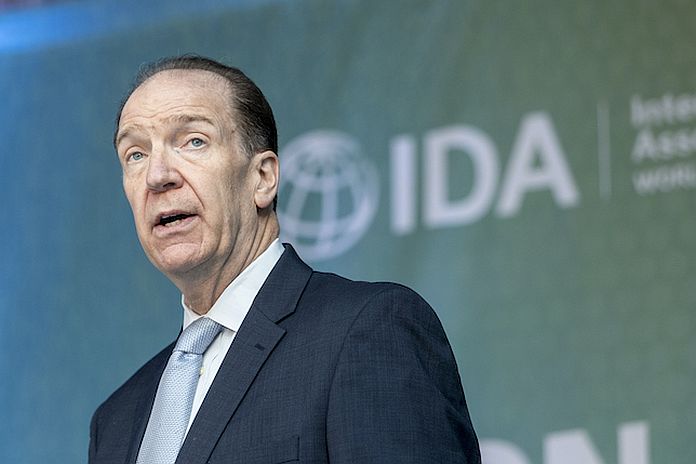Remarks by World Bank Group President David Malpass at the 4th IDA20 replenishment meeting, Wednesday, December 15
By David Malpass
Depending on where you are, good morning or good evening, and congratulations! I’m very pleased to see that the global community has come together once again in support of the world’s poorest countries.
I would like to thank the Japanese government for hosting this IDA20 replenishment meeting. We were looking forward to being with you in person in Tokyo, but as we all know unfortunately this was not possible due to the evolving COVID-19 situation, including the Omicron variant.
Since joining the World Bank in August 1952, Japan has increasingly become one of our closest partners. Japan is now one of the largest contributors to IDA and a key partner in achieving development results at the global, regional, and country level.
For more than 60 years, IDA has provided concessional development financing totaling more than $458 billion to 114 countries, to boost economic growth, reduce poverty and inequality, and improve people’s living conditions.
Working hand in hand with client countries and donors, IDA has helped tackle some of the most complex development challenges. As a testimony to the success of our joint efforts, 37 countries have graduated from IDA support over the years, many of which are now IDA donors and have made financial pledges over the past days.
With the COVID-19 pandemic, the world is facing one of the biggest crises of our time. A lot of the progress achieved over the last decade and a half in terms of poverty reduction, education, health and nutrition has been wiped out by this crisis. At the same time, the effects of climate change present additional challenges across countries.
IDA countries are lagging in COVID-19 vaccinations and economic recovery. We have seen that the recovery has been dramatically uneven, with per capita income in advanced economies growing at 5 percent compared to only 0.5 percent in low-income countries. Two-thirds of the world’s poor – almost 510 million people – live in countries served by IDA.
The World Bank’s crisis response to COVID-19 has been the largest in our history. IDA responded with speed and scale to the unprecedented economic and health crises and committed $56.9 billion between April 2020 and November 2021.
This was made possible by your decision to shorten the IDA19 period and advance the IDA20 replenishment by one year to respond to the urgent needs. I would like to thank you all for supporting these decisive and extraordinary measures.
During the past months, we have worked closely with you and benefitted from your guidance and support. In partnership with all of you, we have developed an ambitious and robust policy, financing and results framework that will guide our support to IDA countries as they continue to address the pandemic crisis and get back on track toward growth.
I would like to express my appreciation to the IDA borrower representatives who have consistently offered their advice, providing a country lens on how our support can best be tailored to meet the needs and priorities of IDA countries. IDA’s country-driven model allows us to target support to those who need it the most and collaborate effectively with UN agencies, multilateral development banks, and other development actors to deliver development outcomes that matter.
The replenishment package agreed is a great show of solidarity and trust in IDA. Your contributions, combined with the amounts that IDA raises in capital markets, repayments of past IDA credits, and contributions from IBRD, make IDA a unique leveraging model that enables greater value and development impact. Every $1 that you contribute to IDA is leveraged into almost $4 of support for the poorest countries. Thank you for your confidence in IDA as a non-fragmented and efficient platform to tackle development challenges and improve the lives of millions of people around the world.
These generous pledges are matched by the most ambitious IDA policy package to date. Thanks to your commitment, we will have increased capacity to prioritize the following key areas:
- Human capital, which is a Special Theme introduced in IDA20, covering vaccines, health and nutrition, education, and safety nets, with a focus on inclusion, including disability inclusion;
- Climate change adaptation, resilience, and preserving natural capital and biodiversity, which is closely aligned with World Bank’s Climate Change Action Plan to help countries integrate climate and development;
- Closing the gender gap, including by investing in women’s empowerment and economic and digital inclusion;
- Job creation, with resilient financial systems, supporting the private sector and infrastructure investments, and boosting productivity and better jobs;
- Addressing situations of fragility, conflict and violence, with tailored country engagement, improving outcomes for refugee and host communities, and strengthening governance and resilience.
Cross-cutting issues that are the foundational building blocks of this policy framework include crisis preparedness, which was introduced in IDA20 to build resilience in a world of more frequent crises with compounded effects, as well as ongoing emphasis on governance and institutions, debt sustainability, and digital infrastructure and interventions to foster economic and social inclusion.
Let me end, once again, by thanking you for your generous support for the world’s poorest countries. We look forward to our continuing partnership with all of you to make a real difference in the lives of millions of the world’s most vulnerable people.
Related: World Bank announces $93B support package to boost resilient recovery in world’s poorest countries





